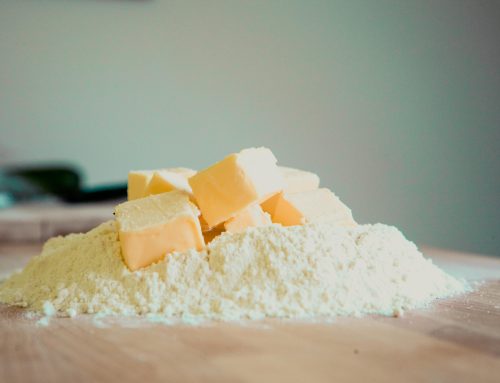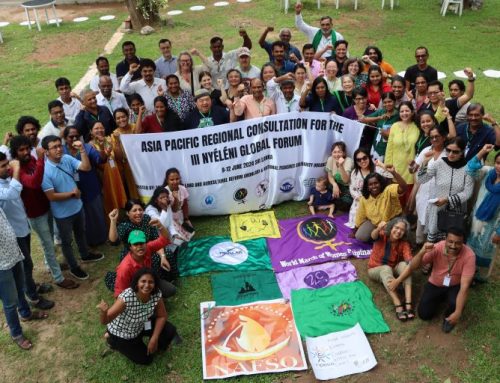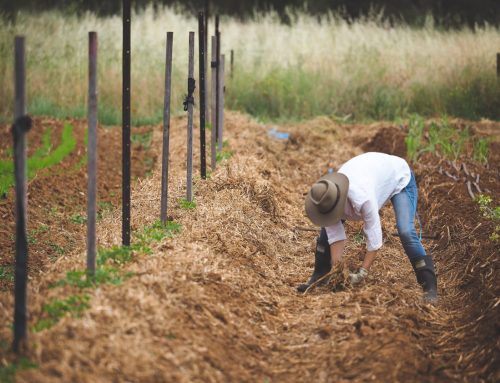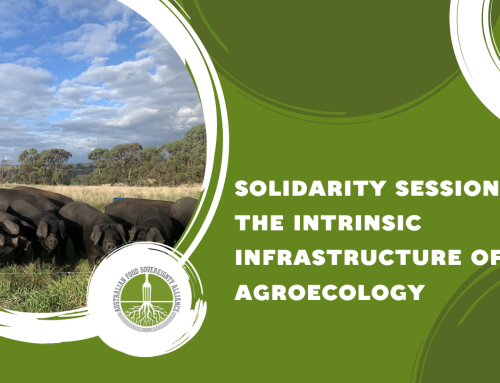For 60,000 years Indigenous Australians have eaten food as their medicine, and yet today Australia, like most of the world, has a disease industry largely caused by a highly industrialised food system.
Over two days in June 2019, 150 small- and medium-scale, mostly young farmers, farm and food workers, educators, and other allies came together from across Australia to meet on the traditional lands of the Kaurna people, who have cared for this land and maintained biodiversity through careful observation, cultivation, and judicious use of fire since long before and after Invasion.
At the fifth annual Deep Winter Agrarians gathering in Willunga, South Australia, we celebrated the opportunity to meet each other to continue weaving relationships, alliances, and solidarity. We strengthened our commitment to grow and distribute food in ethical and ecologically-sound ways, and to assert our collective right to democratically participate in food and agriculture systems.
The weekend was rightly framed and founded on considerations of soil and climate, with a stirring address from climate scientist and soil microbiologist Walter Jehne, who declared that promises of 5% reductions in emissions are political obfuscation. Walter called for a dramatic draw down of carbon – and assured us we can do that simply and naturally by fostering the fungi in our soils that digest carbon. Only with rapid transitions away from the destructive practices of over-tilling, over-grazing, and feckless application of agrichemicals can we regenerate the wasteland we have created.
Healthy soils are the primary reservoirs for Australia’s scarce water resources, with the potential to hold far more water than they currently do. The solution is to build the soil carbon sponge – we must urgently increase the carbon in our soils to improve its capacity to hold water, and the most obvious and clear pathway to that solution is through agroecological practices.
Agricultural producers spend millions of dollars and hours of labour killing things that want to live and growing things that want to die. A weed though, is simply a plant that doesn’t fit our dogma. Weeds are just pioneers that make room for succession. By killing them we constantly recreate the conditions that allow them to prosper – and worse, we kill ourselves while weeds thrive. Ultimately, we agreed that if you can’t beat it, eat it.
There is a paucity of nutritional integrity in food grown in what are essentially hydroponic conditions – fast-growing annuals in tilled soil with regular application of fertilisers. Methods of growing food without tilling are not commonly understood nor practiced. The agrarians in Willunga assert our interest and aims to work to reduce tillage and maintain biomass and healthy mycorrhizal fungi that nurture the roots and ultimately the nutritional integrity of the food we grow.
Farmers have largely lost control of the means of production, and small- and medium-scale farmers are the most vulnerable. Lost access to local abattoirs, grain mills, dairy processing plants, refrigerated storage, and the other infrastructure necessary to transform the produce they grow into saleable products threatens the viability of small and medium-scale producers. Leaders of the emerging grains movement in Australia spoke about their collaborative efforts to localize grain economies, grow heritage grains, and mill them into flour to bake artisanal, nutrient-dense breads.
Some farmers at Deep Winter have already experienced the extremities of our changing climate, suffering such severe water scarcity that they can no longer farm. We re-affirm our commitment to draw down carbon and strengthen the soil carbon sponge on our farms to both mitigate and adapt to climate change, and canvassed ideas to diversify business models and focus on growing biodiverse and resilient species and breeds of plants and animals.
While soil was the foundation of all discussions, we also debated what is the appropriate scale of farming and food businesses focused on feeding people in ethical and ecologically sound ways that are also economically viable. Acknowledging the diversity of scales appropriate to different regions, climates, soils, produce, and production methods, there was consensus that ‘scaling up’ is not inherently good, and should be considered with care for land, animals, farmers, and communities. We acknowledge the strength in collaborative networks of small-scale agroecological farmers and our allies to build diverse and resilient local food economies.
We live in challenging times, and the need for action on climate change has never been more urgent. The ever-growing movement of agroecological farmers embedded in the communities we feed is up to this challenge, and we need everyone to support our efforts to farm responsibly. We call on all of you to pledge to act – one simple action everyone can take is to buy one thing from a farm with a face this week and every week.
Viva la vía campesina! Viva la revolución!
Willunga, South Australia
23 June 2019




